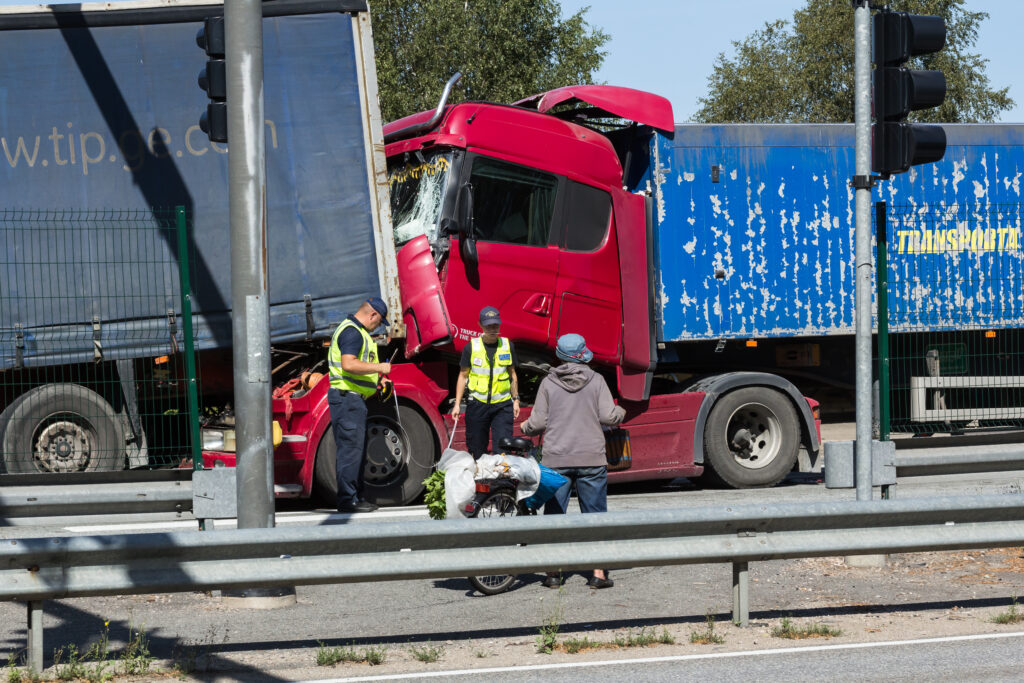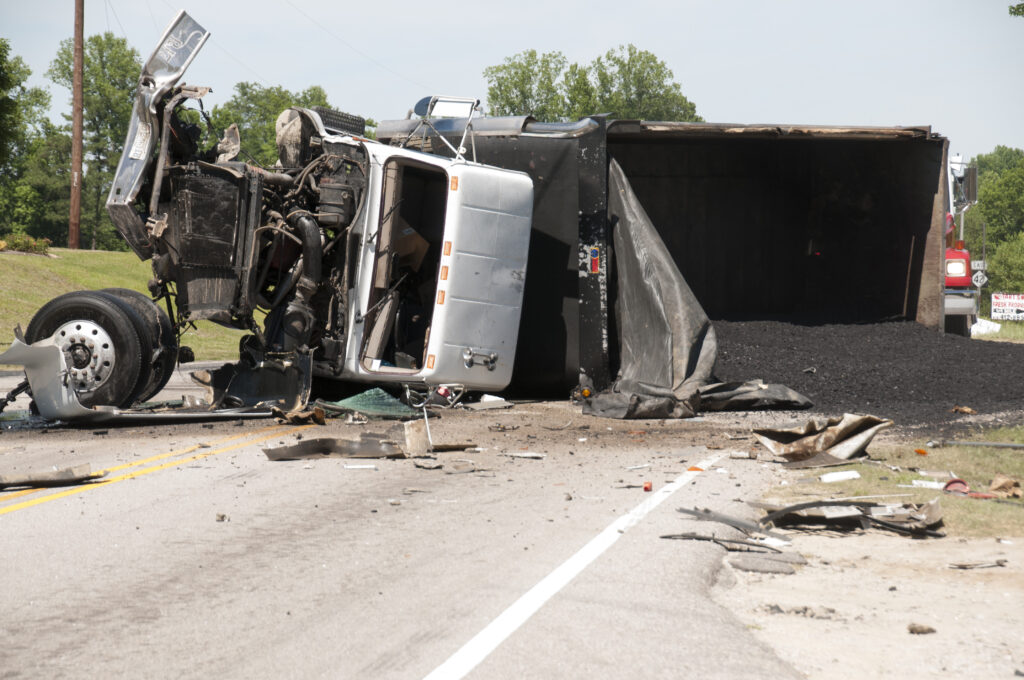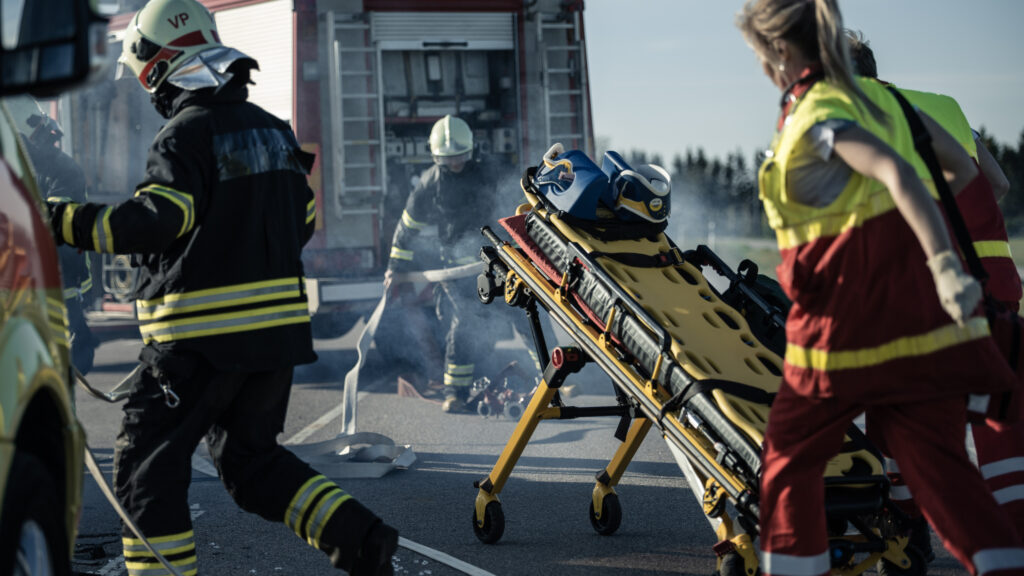Truck accidents are among the most catastrophic road mishaps, often resulting in severe injuries or fatalities. These incidents can occur due to many factors, from driver fatigue to improper cargo loading.
Understanding the types of truck accidents and examining the unique circumstances that lead to each can help identify their causes and implement effective prevention strategies.
The common injuries associated with these accidents, which can vary significantly and alter a person’s life, are another concerning topic.
Whether you’re a professional driver, a fleet manager, or simply a concerned road user, this guide provides valuable insights and actionable advice to enhance road safety, minimize the risk of truck-related accidents and how a Nebraska truck accident lawyer can help you navigate legal complexities.
The Most Common Types of Truck Accidents in the U.S.
Truck accidents often have devastating consequences due to their size and weight.
Here are some of the most often-seen truck accidents:
Jackknife Accidents

A jackknife accident occurs when the trailer of a large truck skews at an acute angle to the cab, resembling a folding pocket knife. It often results from sudden braking or slippery roads, causing the driver to lose control. The trailer swings out and can collide with other vehicles or obstruct the roadway, leading to multi-vehicle pileups.
Rollover Accidents
Rollover accidents happen when a truck tips over onto its side or roof. These are particularly common in high speeds, sharp turns, or improper cargo loading scenarios. Factors such as uneven weight distribution, tire blowouts, or driver error can contribute to these dangerous incidents. Rollovers endanger the truck driver and pose significant risks to nearby vehicles, especially in high-traffic conditions.
Underride Accidents
Underride accidents are among the most lethal truck-related incidents. They occur when a smaller vehicle collides with a truck and slides underneath it.
The lower clearance of the truck can cause severe damage to the passenger compartment of the smaller vehicle, often leading to catastrophic injuries or fatalities.
These accidents highlight the importance of adequate underride guards on trucks and awareness among drivers of smaller vehicles.
Rear-end Collisions
Given the significant weight of trucks, their stopping distances are much longer than those of smaller vehicles. This can lead to rear-end collisions, especially when traffic slows suddenly or when a truck driver is distracted, tired, or following too closely.
A truck rear-ending a smaller vehicle can cause deadly accidents, emphasizing why truck drivers should maintain safe following distances and stay alert.
Blind Spot Accidents

Trucks have more prominent blind spots than typical passenger vehicles, known as No-Zones. When smaller vehicles are in these blind spots, truck drivers cannot see them, increasing the risk of collisions during lane changes or turns.
Truck drivers must clear these blind spots before changing lanes and exercise caution to avoid accidents.
Lost Load Accidents
Improperly secured or overloaded cargo can lead to lost load accidents, where cargo falls off the truck onto the roadway.
This can create hazardous conditions for other vehicles, leading to accidents. Proper cargo securement can prevent these incidents.
Head-on Collisions
Although less common, head-on collisions involving trucks are hazardous. These may occur due to driver fatigue, driving under the influence, veering into oncoming traffic due to distractions, or attempting to overtake unsafely. The high speeds and massive force of impact in head-on collisions often result in severe injuries or fatalities.
To truly revolutionize road safety and minimize truck accidents, embracing a culture of collective responsibility is essential.
This means going beyond individual precautions and engaging in a broader dialogue about road safety.
What Causes Most Truck Accidents?
Truck wrecks can be caused by many factors, often involving a combination of human error, mechanical failures, environmental conditions, and regulatory violations.
Here are some of the primary contributing factors:
Driver Error
Driver error is one of the most significant contributors to truck accidents. This category includes:
- Fatigue: Truck drivers often face long hours on the road with inadequate rest, leading to fatigue, which impairs judgment and reaction times.
- Distracted Driving: Activities like using a cellphone, eating, or using navigation systems can divert a driver’s attention from the road.
- Impaired Driving: Operating a vehicle under the influence of alcohol, drugs, or prescription medication can significantly affect a driver’s abilities.
- Speeding and Aggressive Driving: Exceeding speed limits or engaging in aggressive driving behaviors increases the risk of losing control and causing an accident.
Mechanical Failures

Proper maintenance of trucks is essential to prevent mechanical failures that can lead to accidents:
- Brake Failures: Given the heavy loads trucks carry, any braking system failure can be catastrophic.
- Tire Blowouts: Poorly maintained or overused tires can blow out, causing the driver to lose control.
- Steering and Suspension Issues: Failures in steering or suspension systems can make it challenging to maneuver the truck, especially in emergencies.
Environmental Conditions
Adverse weather and road conditions can significantly increase the risk of truck accidents:
- Poor Weather: Rain, snow, ice, and fog can reduce visibility and make roads slippery, challenging even the most experienced drivers.
- Roadway Problems: Potholes, inadequate signage, and poorly designed roadways can contribute to accidents.
Improper Loading
The way cargo is loaded onto a truck can affect its stability and safety:
- Overloading: Exceeding a truck’s weight capacity can put too much pressure on the tires and affect the vehicle’s stability.
- Unsecured Loads: Cargo that is not adequately secured can shift during transit, leading to imbalances or even falling off the truck.
Lack of Training and Oversight
Proper training for truck drivers is essential for safe operation:
- Inadequate Training: Drivers not adequately trained in safe driving techniques and cargo loading are more likely to be involved in accidents.
- Lack of Supervision: Companies that fail to monitor and enforce safe driving practices and proper vehicle maintenance may contribute to the risk of accidents.
Regulatory Violations
Non-compliance with regulations governing trucking operations can lead to unsafe conditions:
- Hours of Service Violations: Ignoring regulations designed to limit driving hours can lead to driver fatigue.
- Maintenance Shortcuts: Skirting maintenance regulations can result in mechanical failures.
Addressing these causes requires a multi-faceted approach involving stricter enforcement of existing regulations, enhanced driver training programs, improved vehicle maintenance, and public awareness campaigns focused on road safety.
What Kind of Injuries Can You Get in a Truck Accident?

Truck accidents result in a wide range of injuries, from minor to life-threatening, due to the massive size and weight of trucks compared to passenger vehicles.
The severity of injuries often depends on factors such as the speed at impact, the type of collision, safety features in the vehicle, and whether the occupants were wearing seat belts.
Here are some common injuries sustained in truck accidents:
1. Whiplash and Soft Tissue Injuries
Whiplash is a common injury in rear-end collisions caused by the rapid back-and-forth movement of the neck. Other soft tissue injuries can include sprains, strains, and tears to muscles, tendons, and ligaments throughout the body.
2. Broken Bones
The force of a truck accident can easily break bones. Typical fractures in truck accidents include broken ribs, arms, and legs and injuries to the pelvis and collarbone.
3. Head Injuries
Head injuries can range from mild concussions to severe traumatic brain injuries (TBIs). These can result from the head striking an object like the steering wheel, dashboard, or windows or from the violent shaking of the brain within the skull during the crash.
4. Spinal Cord Injuries and Paralysis
The impact of a truck accident can damage the spinal cord, potentially leading to partial or complete paralysis. These injuries vary in severity, from temporary numbness or weakness to permanent quadriplegia or paraplegia.
5. Internal Injuries
The force of a collision causes internal organs to be bruised or punctured. Common internal injuries include internal bleeding, lung punctures, liver or kidney damage, and spleen ruptures.
6. Lacerations and Abrasions
Broken glass, metal fragments, and other debris can cause cuts and scrapes. These injuries can range from minor to severe, potentially leading to significant blood loss or infection.
7. Burn Injuries
In cases where a truck accident leads to a fire or an explosion, it can burn the occupants. Burns range from first-degree, which affects the outer layer of skin, to third-degree, which can damage muscles, bones, and nerves.
8. Psychological Injuries
Beyond the physical injuries, truck accidents can also lead to significant psychological trauma, including post-traumatic stress disorder (PTSD), anxiety, depression, and phobias related to driving or traveling in vehicles.
9. Amputations
In severe cases, limbs or extremities may be so badly damaged that they require surgical amputation.
10. Fatal Injuries
Tragically, truck accidents can result in fatalities, either instantaneously or due to severe injuries that cannot be medically treated.

Recovery from these injuries can involve long-term medical treatment, physical therapy, and, in some cases, psychological counseling to deal with the trauma of the accident.
The physical, emotional, and financial toll of these injuries can be immense, impacting not only the victims but their families as well.
How Can a Personal Injury Lawyer Help?
A personal injury lawyer in Nebraska can be invaluable to a truck accident victim, providing legal guidance, emotional support, and advocacy to navigate the complex aftermath of an accident.
Here are some things they can provide:
- Legal Experience and Guidance: Personal injury lawyers concentrating on truck accidents understand the specific legal nuances and regulations governing the trucking industry, including federal and state laws. They can guide victims through complex legal processes, ensuring they know their rights and the steps required to pursue compensation.
- Accident Investigation: A thorough investigation is crucial to establish liability in truck accidents. Personal injury lawyers often work with accident reconstruction experts, forensic specialists, and investigators to gather evidence, such as trucking logs, maintenance records, driver histories, and black box data. This comprehensive approach helps in building a bulletproof case.
- Damage Assessment: Calculating the full extent of damages goes beyond immediate medical bills. Personal injury lawyers consider long-term implications, such as future medical expenses, lost wages, loss of earning capacity, pain and suffering, and emotional distress. They ensure that the compensation sought reflects the full scope of the impact on the victim’s life.
- Insurance Company Negotiations: Insurance companies often aim to minimize payouts. Personal injury lawyers have experience negotiating with these companies and can advocate for a fair settlement that adequately covers the victim’s damages. They can also navigate the complexities of dealing with multiple insurance policies, which is common in truck accident cases.
- Court Representation: A personal injury lawyer is prepared to represent the victim if a fair settlement cannot be negotiated. They will handle the entire litigation process, from filing the lawsuit to presenting evidence and arguing the case before a judge or jury.
- Timely Filing of All Paperwork: Personal injury claims are subject to statutes of limitations, which are filing deadlines. A personal injury lawyer ensures that all necessary legal actions are taken within these time frames, protecting the victim’s right to compensation.
- Peace of Mind: Dealing with the aftermath of a truck accident can be overwhelming for victims and their families. Having a personal injury lawyer handle the legal aspects allows victims to focus on their recovery, knowing their case is in capable hands.
- No Upfront Costs: Most personal injury lawyers work on a contingency fee basis, meaning they only get paid if they win the case or secure a settlement. This arrangement allows victims to pursue justice without worrying about upfront legal fees.

A personal injury lawyer plays a pivotal role in leveling the playing field for truck accident victims, ensuring they have the resources and representation necessary to secure the compensation they deserve for their injuries and losses.
In the vast expanse of our roadways, the stories of truck accidents are stark reminders of our shared vulnerability and the imperative for vigilance.
By fostering a safety culture informed by the intricate dance of cause, effect, and prevention, we weave a collective tapestry of resilience against the unforeseen.